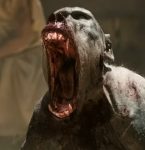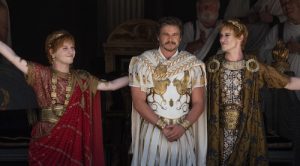I feel like I need to apologize for whatever smug twit thought it was clever to put that “II” in the middle of “Gladiator”. Its appearance in the title card was, however, the last bit of wit in this entire movie, and was also representative of the botched, gimmicky plot of the sequel.
First, the historical background, even though it really doesn’t matter. In the early 200s CE, Caracalla, a Gallic soldier, was emperor of Rome for about 20 years; his brother, Geta, was briefly co-ruler before he was assassinated by the Praetorian Guard. Caracalla himself was also murdered by the Praetorian Guard, and was succeeded by Macrinus, the Praetorian prefect, who only ruled for about a year before he lost a battle near Antioch and got himself executed. There. That’s more history than you need, because this movie is going to jettison everything but the names and compress everything down to a couple of days one summer in Rome. Time has no meaning.
The gladiiator in the title is a soldier who is captured in the battle which led to Rome conquering Numidia…sometime around 200 CE. Wasn’t Numidia annexed by the Emperor Augustus, somewhat before then? No matter, this isn’t history. He’s hauled off to Rome as a slave, thrown into the arena, and kills a mangy monkey (I’m not belittling the accomplishment, it really is one hideous, terrifying baboon with huge fangs and a temper, so good on him.) The emperors, a pair of drooling psychopathic halfwits that I mentally labeled as Short Ed Sheeran and Tall Ed Sheeran, were impressed, as were some rebellious senators, as was his mom. It turns out that Gladiiator is the son of the gladiator from the first movie! It’s a hereditarian miracle!
Anyway, there are some more fights in the arena, including a spectacular naval battle. Tall Ed Sheeran gets murdered, and then Short Ed Sheeran gets murdered, and then, somehow, Gladiiator gets a legion to march on Rome, which is confronted by a Roman legion. The ending gets very confusing as Gladiiator is teleporting all over the place to wherever the plot finds convenient; also, Rome seems to be very tiny, as he ends up posing by the singular Gate of Rome, with the whole city laid out behind him, which is mostly empty except for one prominent feature, the Colosseum, of course.
In a climax fitting for a Marvel superhero movie, the cunning, scheming, clever primary bad guy gets on a horse and gallops to the space between the two legions, dismounts, and gets into a one-on-one swordfight with the monkey-killing gladiiator. It made no sense. Nothing in this movie makes sense. Time and space are meaningless. Murderous ridiculous clowns can rule the world, which is at least believable now in the 21st century.
I was not entertained.




A good summary. It was a terrible film.
From what I understand the Roman gladiator world was closer to modern pro wrestling than the wanton murder we think of. It could be dangerous, but spectacle was the primary goal.
Or Homer. No, not the dad from the Simpsons. The Achilles vs Hector one. But I get hating on Marvel is trendy right now so whatevs.
For a very intersting historian’s view on the movie, see here and here.
Caracalla wasn’t a “Gallic soldier”. His father, emperor Septimius Severus, was of Numidian/Punic descend…which makes the conquest of Numidia at the beginning of this movie, even though by the date of the film it had been a Roman province for more than 200 years, especially baffling.
Presumable a GladIIator is one who uses two swords at once.
Caracalla was sole Emperor for six years. Yes, he was technically co-Augustus with his father but had no actual power during that time.
Watched the movie last night (I am a Roman archaeologist). Yes, the history was bad, but not really worse than the first movie. I found it pretty much reprising the plot of the first movie, with a few cosmetic changes.
Gladiator was fine as an action pic (though not a historical epic) — I gave it a B at the time and would maintain that grade. Gladiator 2 didn’t add or subtract much; Denzel Washington managed to partially rescue the picture. Perhaps a B- or C+.
One of the funny parts was how the movie unintentionally showed the sheer impracticality of holding mock naval battles in the Colosseum. In reality, the Romans held mock naval battles (which were a real thing) in specially-constructed artificial lakes.
At least the Conan films had no pretension of being based on history. Conan II: Revenge of Grace Jones was fun to watch.
.
This film reminds me of a western film presented in Brandon’s Cult Movie Reviews that was based in the American west, had a European princess and some asian horsemen baddies.
Actually, that film looked entertaining!
During the time around Septimus Severus interesting things were happening outside Rome.
The Parthian kingdom was about to be suppleanted by the much more dangerous neo-Persian empire. Stuff happened in China and India.
The northern horsemen were always restless.
Film company executives are as devoid of imagination as they are full of greed.
…and a petty king named Gandalf lived in what is today western Sweden. The iron age is the approximate period of the Beowulf myth.
The mock sea battles were indeed a thing, and we do have Roman sources that say they were held in the Colosseum, very early in its existence. Both Suetonius and Cassius Dio mention Vespasian’s sons, Titus and Domitian, putting on naumachiae soon after the building was completed. Whether these used actual Roman ships (earlier Roman mock sea battles apparently did) or something more like ship-shaped carnival floats standing in a few feet of water is anyone’s guess. The logistics and optics of it would probably necessitate smaller ships – you could maybe get three or four full-sized triremes into the arena with little room for manouvre. But later on there were tunnels and rooms dug out below the surface of the arena, so it is unlikely the whole thing could have easily been waterproofed by the time of Caracalla.
The thing about modern recreations of Gladiator shows is that, while they often recreate small details accurately, they tend to fail spectacularly at getting across what the whole cultural institution was all about. Yes, it was spectacle and entertainment, but it was also an important opportunity for Roman audiences to reinforce their Roman-ness and an imaginative space in which to map out the known world and its boundaries of power, hierarchy and imperial control. The spectators in the stands were Roman, irrespective of ethnic origin, while the fighters in the arena were slaves and animals. Putting on a sea battle demonstrated mastery enough over the elements to invert the normal places of land and sea, and could recall famous Roman victories like Actium or the Punic Wars. Stories about Emperors like Commodus going into the arena and fighting as gladiators were scandalous because they inverted this carefully delineated order of things – the Emperor was supposed to stay in his box watching the fighting, not take part in it like a slave (this is also why such events as the Pompeiian riot at the games of 59 were so infamous – the fighting spread to the streets outside and the spectators, it wasn’t carefully contained in the arena where it should be). The funding and curation of gladiator games were an important way for the wealthy to show generosity and public spirit.
I’ve not seen Gladiator II. Not sure I really want to, given what I’ve heard. But it certainly can tell us interesting things about the culture that produced it.
you forgot the sharks!
I remember the first one, when my friends gushed about it.
It was fucking shitty and stupid.
Mystic crock. Fireballs and elevators!
(Russell Crowe as a Spaniard, eh?)
@4 So it’s like a Frank Herbert novel?
Personably, I cannot think ill of Caracalla after having seen the area where his thermae still stand, a bit worse for the wear admittedly. Awesome place, and it was built in just five years (trying to forget about all the slave labor involved, ahem).
According to the first of the history posts which Lasius @4 linked, Numidia became a Roman client state as early as 200 BCE, and was absorbed into the Empire during the 40s BCE. Also, the emperor Septimius Severus (Caracalla’s father) was born there.
@cartomancer #6:
The sequel is going to be challenging.
John @13:
Not sure what your problem is. Would he have looked out of place in Hispania circa 150-200 CE? Probably lots of blue-eyed fair-haired Celts around back then.
Trust me on this. It’s fucking obvious.
Nothing — absolutely nothing — about his looks or persona or demeanour or anything at all has any correlation with Spanishness. Zero.
<snicker>
Celtishness is a cultural thing, not a genetic one. And it was only ever a thing in the NW of Iberia, which might as well have been a continent away for the inhabitants in other parts of the peninsula.
(https://en.wikipedia.org/wiki/Galician_gaita)
[now, Antonio Banderas, he would have been good casting]
Why? Have you studied the historical ethnic profile of Spain, or are you just assuming Spaniards always looked the same?
Often a mixture of the two.
Nonsense.
(sigh)
It’s not an objective thing.
You think he looks very Spanish, fine.
In Spain. Nope.
Look at my picture about the Spanish version of bagpipes.
—
“Ethnographic and Linguistic Map of the Iberian Peninsula at about 300 BCE.” is the illustration to your article.
Anyway. I don’t pretend to know much about Spain and its history, other than being born there and living there until I was twelve and being educated there about Spanish history.
(Only the NW bit remained after the Moorish conquest, you know)
You know, when I was in school, I remember we used to talk about how tough these blonde kids were.
We figured we could maybe hold our own, but still… we had dark hair.
(We saw USAnian movies, and the blonde kids were really tough in them)
So which film is more historically inaccurate?
This Gladiator one? Braveheart or 300?
Worst historical accuracy of all time?
Is the an award for the worst historical writing just as there is for the worst erotic writing and, if not should there be?
PS. How about Apocalpto? (https://en.wikipedia.org/wiki/Apocalypto ) Or the other more famous Mel Gibson historical gorefest set in ancient Judea?
@23. John Morales : Only the NW bit remained after the Moorish conquest, you know.
Huh, looks like the rest of Spain is still there now to me! ;-)
Guess like the termporary newt-ness of the man in the Monty Python Holy Grail witch scene it got better! (Tho’ not sure the Moors would agree..)
Oh and does this mean that less is Moor?
( Why yes, am I sleep deprived even more than usual, currently, how’d ya guess!)
@lasius #4 that’s a good point, though i’m not sure i agree with ‘all’. does that include Denzel’s character?
@27. Or rather Moor or less as I shoulda put it. Sigh.
@28 dusk
Yes. Yes it does.
@ 25 StevoR
Of the ones you named, I’d say 300.